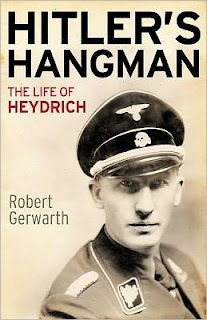“Hitler’s
Hangman: The Life of Heydrich” by Robert Gerwarth,
Yale UP,
£20.00, 336pp,
It is peculiar that Reinhard
Heydrich has not been the subject of a few more serious-minded
biographies. After all, as the architect
of the SS-state and the master-planner of the Holocaust, he offers a unique
perspective on the inner workings of the Third Reich, whilst as an individual
he displays the sort of nefarious, Mephistophelean character traits that would
have many historians salivating.
Yet,
despite his high profile in the historical record, Reinhard Heydrich has until
now only rarely attracted the attentions of serious English-language
biographers. Robert Gerwarth’s book is
something of a rarity therefore.
It
is certainly worth the wait. Gerwarth ably
tracks the stages of Heydrich’s life; from his early years in Halle
Once installed in Himmler’s security apparatus, from
1931, Heydrich would be the driving force in the emergence of the SS,
constantly expanding its remit and espousing a perpetual radicalisation of
Nazism. He was ever vigilant, seeking
out new enemies – real or imagined – to be confronted and destroyed. Not so much a safe pair of hands, rather a
radical and utterly uncompromising administrator, Heydrich quickly emerged as
the coming man of Nazi Germany.
His
career was correspondingly stellar.
Already Himmler’s deputy, he headed the Reich Security Main Office
(RSHA) from 1939, thereby uniting all branches of the Nazi police and security
network under his control. Later, in
1941, he was appointed to head the politically sensitive and economically vital
‘Protectorate’ of Bohemia and Moravia
Gerwarth
tells this complex tale with considerable aplomb. He writes with real verve, pacing his account
well and providing the perfect mix of narrative and analysis. Pleasingly, he is not shy of indulging in a
few dramatic flourishes when the material and the circumstances allow, making
this a history book that one can genuinely read almost in a single
sitting. Moreover, he is surefooted and
admirably clear on the historical framework, not least in explaining the murky
and complex inter-relationships within the Nazi police state, and delineating
the twisted course of the genocide against the Jews.
The
Heydrich that emerges from this account is a more rounded individual from the
earlier, sometimes rather breathless, biographies. He is revealed here as a human being; a
single-minded, paranoid, psychopathic human being, but a human being
nonetheless. Interestingly – in a state
that prized physical and racial perfection – Heydrich was the only one of the
senior personnel who came anywhere close to matching the taxing ideals, despite
a persistent rumour of his part-Jewish blood.
Tall, blond, aquiline, he was an accomplished sportsman (he fenced at
national level), a gifted violinist and a trained pilot. A man of deeds rather than theories, he was
an ascetic and workaholic and he played the Byzantine world of Third Reich
politics like a chess grandmaster. He
was as close to a “Nazi Renaissance man” as it was possible to get.
Robert
Gerwarth set out to remedy the lack of a scholarly biography of Reinhard
Heydrich – one of the most pivotal and influential figures in the history of
the Third Reich. He has succeeded
admirably, producing a work that is as authoritative as it is enjoyable, and in
the process setting a new standard by which subsequent biographies of Hitler’s
‘Blond Beast’ will surely be measured.
Link to Gerwarth's "Hitler's Hangman"
This review first appeared in "History Today" in July 2012

What does Gerwarth make of that "persistent rumour of his part-Jewish blood"?
ReplyDeleteAlso curious about his view of Heydrich's performance as Governor-General of Bohemia and Moravia; was he really the enlightened despot Irving makes out?
I wouldn't give much credence to Irving, to be honest.
ReplyDeleteRegarding the 'part-Jewish blood' - Gerwarth suggests that it was a myth.